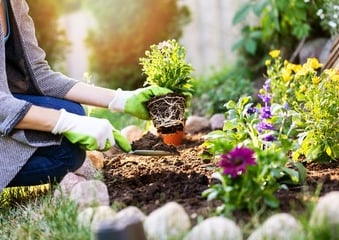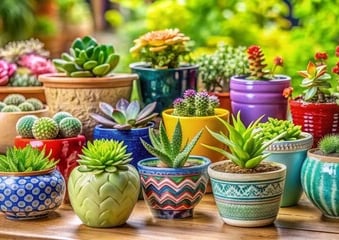The Healing Power of Gardening: How Nature Boosts Mental Health
Gardening offers profound mental health benefits, serving as a natural remedy for stress and anxiety. Engaging with nature through planting and nurturing can elevate mood, reduce symptoms of depression, and foster a sense of accomplishment. The rhythmic tasks of gardening, coupled with the beauty of blooming plants, create a calming and restorative experience that enhances overall well-being.
In today’s fast-paced world, where stress and anxiety seem to be constant companions, many are turning to nature as a source of healing. One of the most accessible and rewarding ways to reconnect with nature is through gardening. Whether you're tending to a small herb garden on your windowsill or cultivating a backyard oasis, the simple act of nurturing plants can have profound effects on your mental well-being. Let’s explore how gardening can boost mental health and why it might just be the therapy you never knew you needed.
1. Reducing Stress and Anxiety
Gardening has a magical way of helping us disconnect from the chaos of daily life. When you focus on tasks like planting, watering, and pruning, your mind naturally shifts away from worries and onto the present moment. This mindfulness, similar to meditation, helps reduce cortisol levels (the hormone linked to stress) and promotes a sense of calm. Studies have shown that even just 30 minutes of gardening can lower stress levels and improve overall mood, making it a powerful tool for combating anxiety.
2. Connecting with Nature
Spending time outdoors and connecting with nature has been linked to numerous psychological benefits. Fresh air, sunlight, and the natural environment can help elevate your mood and reduce symptoms of depression. Exposure to sunlight also boosts your body's production of Vitamin D, which is essential for regulating mood and warding off depression, particularly in the colder months when we spend less time outside.
The tactile experience of working with soil—sometimes called “grounding”—also plays a role in promoting a feeling of connection and stability. Research even suggests that soil contains certain microbes that act as natural antidepressants, triggering serotonin release, which elevates mood and decreases anxiety.
3. Fostering a Sense of Purpose
One of the key mental health benefits of gardening is the sense of accomplishment it provides. Watching something grow and thrive due to your care and attention can be incredibly rewarding. Whether it’s a tomato plant producing fruit or a flower blooming for the first time, these small victories offer a sense of purpose and fulfillment that is often missing in our hectic lives. Gardening allows you to nurture life, giving you a sense of responsibility and accomplishment, which is vital for boosting self-esteem and combating feelings of helplessness.
4. Promoting Physical Exercise and Mental Clarity
Gardening may not seem like intense exercise, but it requires plenty of movement—bending, stretching, digging, lifting, and walking. This physical activity increases blood flow, reduces tension in the body, and releases endorphins—our body’s natural mood enhancers. The combination of fresh air, gentle exercise, and the mental focus required for gardening can help clear your mind, reduce fatigue, and improve cognitive function. In fact, research has shown that gardening can reduce the risk of dementia and improve brain function, especially in older adults.
5. Cultivating Patience and Mindfulness
In a world where instant gratification is often the norm, gardening teaches patience. Plants take time to grow, flowers take time to bloom, and not everything will thrive despite your best efforts. Gardening is a slow and steady process, reminding us that good things take time and that progress happens in stages. This patience and mindfulness can help improve emotional regulation and encourage a more peaceful, accepting mindset.
6. Social Connections and Community
Gardening doesn’t have to be a solitary activity. Many communities have local gardening clubs, urban farms, or neighborhood initiatives where individuals come together to cultivate shared green spaces. This social aspect of gardening helps foster connections with others, reducing feelings of isolation and loneliness. Whether you’re swapping tips with a neighbor or working in a community garden, the act of gardening can create a sense of belonging and encourage meaningful interactions.
7. Healing Trauma and Promoting Recovery
Gardening has been used in therapeutic settings for decades to help individuals recover from trauma, grief, and addiction. Known as horticultural therapy, this practice uses gardening as a means of improving mental and emotional well-being. The nurturing process of growing and caring for plants helps individuals reconnect with themselves and the world around them, offering a sense of control and renewal. Many find that the repetitive, hands-on tasks of gardening provide a safe space for reflection and healing, aiding in the recovery from trauma and emotional distress.
How to Start Your Healing Gardening Journey
You don’t need a large yard or extensive knowledge to start benefiting from the healing power of gardening. Here are a few simple steps to get started:
- Start Small: Begin with a few potted plants, an herb garden, or a small flowerbed. Focus on plants that are easy to grow and maintain.
- Create a Routine: Set aside time each day or week to tend to your garden. Establishing a regular routine can help create structure and provide a calming ritual.
- Be Mindful: Take your time when gardening. Focus on the textures, smells, and sights of the plants around you. Let yourself be fully present in the moment.
- Connect with Others: Join a gardening club, attend a workshop, or engage with online gardening communities to share experiences and seek support.
- Celebrate Growth: Take pride in your progress, whether it’s a single bloom or a thriving vegetable garden. Celebrate the joy of nurturing life.
Gardening offers far more than just beautiful flowers or fresh vegetables. It’s a powerful therapeutic tool that can help reduce stress, improve mood, and foster a deeper connection with both nature and ourselves. As you nurture your garden, you may find that it’s also nurturing you, offering comfort, peace, and healing in ways you never imagined. So grab your gloves, dig in, and let nature do its magic—your mind and soul will thank you.




